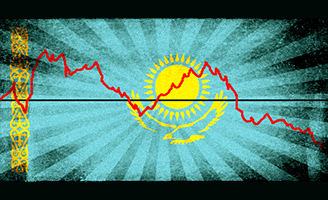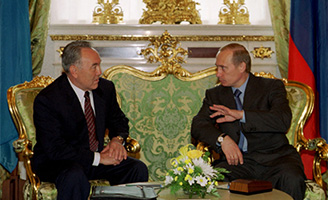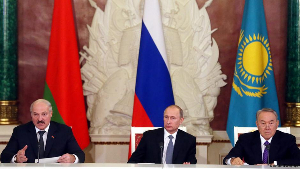Hanging in The Trade Balance: Is Free Trade a Curse for Kazakhstan?
By Sergei Gretsky (06/10/2015 issue of the CACI Analyst)
The creation of the Eurasian Economic Union (EEU) was presented as a vehicle for economic development of Belarus, Kazakhstan, and Russia as a result of the removal of barriers to free movement of goods, capital, and labor between the three states and creating a common market. Its inauguration on January 1, 2015, happened at a very inopportune moment as Russian economy, the largest of the three, was sharply contracting due to falling global commodity prices and western sanctions over Ukraine. Economic recession in Russia has had a negative ripple effect on Belarusian and Kazakhstani economies, which led some in Kazakhstan to second-guess the benefits of joining the EEU.

CACI Analyst, March 3, 2015
CACI Analyst, March 4, 2015 (.pdf)
Contents
Analytical Articles
KAZAKHSTAN AND THE EEU, by Dmitry Shlapentokh
U.S. NEW SILK ROAD INITIATIVE NEEDS URGENT RENEWAL, by Richard Weitz
IS “TURKISH STREAM” A SERIOUS THREAT TO THE TRANS-CASPIAN PIPELINE?, by Juraj Beskid, Tomáš Baranec
CASA-1,000 – HIGH VOLTAGE IN CENTRAL ASIA, by Franz J. Marty
Field Reports
KYRGYZSTAN’S RESIGNED PROSECUTOR-GENERAL GIVES WORRYING PRESS CONFERENCE, by Arslan Sabyrbekov
MOSCOW PLEDGES TO COUNTERACT GEORGIA’S INTEGRATION WITH NATO, by Eka Janashia
ARMENIA TOUGHENS ITS STANCE AGAINST TURKEY, by Erik Davtyan
FOREIGN MINISTERS OF TURKEY, AZERBAIJAN AND TURKMENISTAN DISCUSS ENERGY AND TRANSPORTATION IN ASHGABAT, by Tavus Rejepova
Kazakhstan and the EEU
By Dmitry Shlapentokh (03/04/2015 issue of the CACI Analyst)
January 2015 marked the beginning of a new relationship between Russia, Kazakhstan and Belarus bound together by the Eurasian Economic Union (EEU). Yet the emerging friction between Astana and Moscow indicates the pitfalls of the EEU as a project, at least as conceptualized by the Kremlin. In August 2014, Kazakhstan’s and Russia’s leaderships engaged in an exchange of cold remarks. Through late fall (October-November 2014), Russian politicians and journalists discussed the suffering of Russians in Northern Kazakhstan and Russia’s responsibility for their situation. As the EEU was finally inaugurated, economic and geopolitical tensions between Astana and Moscow continued, indicating the EEU’s economic and geopolitical instability.

The Eurasian Economic Union – Implications for Governance, Democracy and Human Rights
By Daniel Linotte (12/10/2014 issue of the CACI Analyst)
In January 2015, a new regional agreement will enter into force between Belarus, Kazakhstan and Russia – it will create the so-called Eurasian Economic Union (EEU), replacing the Eurasian Economic Community (EEC) established in 2006. Taking into account actual trade flows and national economies, the EEU can hardly be justified and should not have much impact on economic integration among its members. Nevertheless, Western countries should still be worried about possible non-economic consequences of the new agreement, especially for governance, democracy and human rights, in countries that are already displaying authoritarian tendencies.






